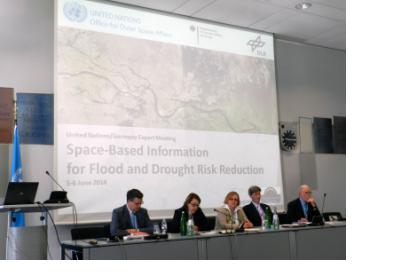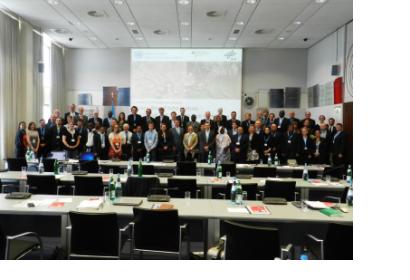UNOOSA/UN-SPIDER and its partners, the German Aerospace Center, the German Ministry of Economics and Energy and Secure World Foundation, successfully held the "United Nations/Germany Expert Meeting on Flood and Drought Risk Reduction" in Bonn, Germany from 5 to 6 June 2014. The event brought together more than 60 international experts from Asia, Africa, America and Europe, who are involved in disaster risk management, remote sensing, and hydrology and drought management. The meeting concluded with the presentation of a set of recommendations regarding how best to promote the use of space-based applications as a way to reduce the impacts and effects of floods and droughts worldwide.
In her opening remark, UNOOSA's director, Ms Simonetta Di Pippo, highlighted the relevance of the topic of the conference: "As you are aware, disasters affect all regions of the world, and hydrometeorological disasters such as floods and droughts are the most recurrent types of disasters worldwide. In addition, the International Panel on Climate Change has already warned us about more frequent and more intense hydrometeorological events that will surely lead to worse disasters in the coming decades if we do not strengthen our resilience." She also stressed that governments need to be enabled to become more "pro-active" as opposed to just "re-active" when it comes to disasters.
Ms Margitta Wülker-Mirbach of the German Federal Ministry of Economics and Energy (BMWi) pointed out the importance of reliable geospatial information for development cooperation. "We all know that disasters have a significant impact on human life. Germany is convinced of the benefits of space-based information including for flood and drought risk reduction. There is a need to strengthen disaster risk reduction and early warning systems."
Mr Stefan Voigt of the German Aerospace Center (DLR), highlighted the importance of Earth Observation for disaster risk reduction. He also brought up the issue of humanitarian technologies, even beyond space-based technologies. "We need to think broader than space alone," he said in his welcoming remark.
Mr Ray Williamson of the Secure World Foundation stressed that outer space needs to be sustainable for space activities in order to benefit from the advantages that satellite technologies provide for us. He re-iterated Secure World Foundation's strong interest to support UN-SPIDER and the use of space-based information for disaster risk management.
The participants discussed the use of space-based information in the context of floods and drought in four sessions with plenary presentations and focused discussion groups. One session specifically focused on the incorporation of space-technologies in the post 2015 disaster risk reduction framework. In his closing remarks, UN-SPIDER Senior Programme Coordinator, Mr Luc St-Pierre stressed again that droughts and floods are the most damaging hazards in terms of destruction they cause and negative effects on the economy. "UN-SPIDER will therefore keep addressing these two hazards through our activities and through our online Knowledge Portal," he pointed out.
The report including the recommendations that emerged from the expert meeting will be published shortly on UN-SPIDER's Knowledge Portal.


